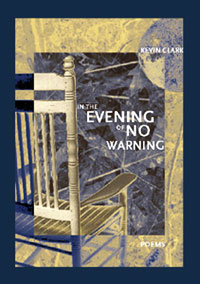Grant Awarded from the Academy of American Poets
Published by New Issues Poetry and Prose
Buy at Amazon Buy at PublisherPraise for In the Evening of No Warning
Kevin Clark’s poetry understands the limits of eros by experiencing those limits openly and thoroughly.… And he understands passion for what it is, polymorphous, heartstrong and headdriven, not idea finally or ever, but protean force, to be ridden and ridden out and ridden again. Somehow this ecstatic poetry stops short of oblivion, accepts its margins, and seeks out the lovely surviving presences of marriage and family. I love this book for the flash and patience of its intelligence, but I learn what love is by the unique human occasion of it.
—Bill Olsen
In Kevin Clark’s poetry there is an acute recognition of the precarious nature of our ordinary lives. He reminds us that we are always on the verge of falling; but in these poems, whether we fall into grace or misfortune, it’s always into deeper knowledge, deeper appreciation for hard-won gifts.
—Kim Addonizio
Kevin Clark’s new volume of poetry, In the Evening of No Warning, wears the anxious velvet mantle of Time gone magical with sleights of hand. What vanishes is us. Yet, the very passing itself, musical with its children’s hour, becomes the unthinkable and sublime refuge that all the local nostalgias gather about. Many of these poems are altogether sweet and perfect. This is a wonderful book.
—Norman Dubie
It is impossible not to listen to this poet whose voice takes us, gently, always gently, along for a hard, hard ride through loss, through the fears and pains of the past that shadow not only the past but also the future, and then back, to the land right now around us, “the sun raking /dry winds, the empty air always satisfied / with our words.” More than satisfied with the words of his first book, we will need patience to wait for Kevin Clark’s second.
—from a review in Borderlands, by Wendy Barker, The Berkeley Years and Way of Whiteness
[“Widow Under a New Moon”], collected in an anthology of the best poems from The Georgia Review, is about the death of the poet’s father. But Clark never mentions his father’s death—instead, his attention is directed to his mother’s grief and this makes us feel the impact of his “absent father” all the more. Now that’s poetry at its best! It’s not easy to create such an effect. It calls for a balanced tightrope walk between giving the reader enough hints without revealing too much.—from a review in ForPoetry.com by Jacqueline Marcus, author of Close to the Shore, editor of ForPoetry.com

